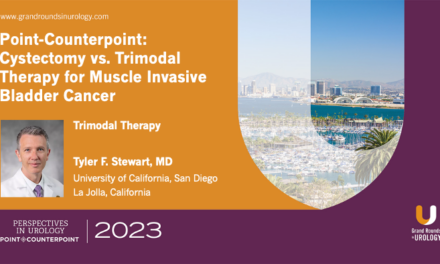Shirley H. Lee, CRNP-FNP, MPH, presented “Point-Counterpoint: PCR and NGS is the New Standard for Clinical Evaluation, not Culture and Sensitivity – Con” during the 30th Annual Perspectives in Urology: Point-Counterpoint, on March 10, 2023, at Humphreys Half Moon Inn, San Diego, California.
How to cite: Lee, Shirley H. “Point-Counterpoint: PCR and NGS is the New Standard for Clinical Evaluation, not Culture and Sensitivity – Con.” March 10, 2023. Accessed May 2024. https://grandroundsinurology.com/point-counterpoint-pcr-and-ngs-is-the-new-standard-for-clinical-evaluation-not-culture-and-sensitivity-con/
Point-Counterpoint: PCR and NGS is the New Standard for Clinical Evaluation, not Culture and Sensitivity – Con – Summary
Shirley H. Lee, CRNP-FNP, MPH, argues against polymerase chain reaction (PCR)/ next-generation sequencing (NGS) as the new standard of care for clinical evaluation of urinary tract infection (UTI), favoring culture and sensitivity instead. Lee asserts that using PCR/NGS as the new standard for evaluating UTI may lead to antibiotic overuse and points out the consequences can’t be anticipated.
Dr. Lee explains that historically the goal was to eradicate all bacteria from the urine while today, clinicians understand that some bacteria act intracellularly while others just attach to the surface and today’s goal is to treat proven and symptomatic UTI. Lee addresses some drawbacks of culture as well as advantages and disadvantages of NGS and PCR before turning back to the issue of overtreatment.
Dr. Lee explains that the primary goal of treatment should be the amelioration of symptoms and prevention of complications and asserts that antibiotic resistance has increased since the COVID-19 pandemic. She acknowledges there are many studies comparing PCR/NGS vs. Cultures, but points out their limitations and asserts more are needed.
Dr. Lee enumerates key takeaways, including that PCR/NGS may not distinguish between uropathogens and normal urobiome; there is insufficient evidence as to whether data from PCR/NGS has clinical relevance; PCR/NGS may cause overuse of antibiotics with consequences that practitioners cannot fully anticipate. She asserts PCR/NGS should be limited to situations where infection is strongly suspected despite negative culture, to situations with recalcitrant infection, and to use by specialists (e.g., urology, infectious disease). Finally, Lee asserts that a test that can find more things does not equal better patient care and clinical judgment is key in treatment decision making.
This lecture is part of a Point-Counterpoint debate. Its opposing lecture is “Point-Counterpoint: PCR and NGS is the New Standard for Clinical Evaluation, not Culture and Sensitivity – Pro.”
About the 30th Annual Perspectives in Urology: Point Counterpoint conference: Presented by Program Chair and Grand Rounds in Urology Editor-in-Chief E. David Crawford, MD, this conference brought together leading experts in urology, medical oncology, and radiation oncology to discuss and debate the latest topics in genitourinary cancers, primarily prostate cancer and bladder cancer. This interactive conference offered topical lectures, pro/con debates, interesting-case presentations, interactive panel discussions, and interactive audience and faculty networking.


